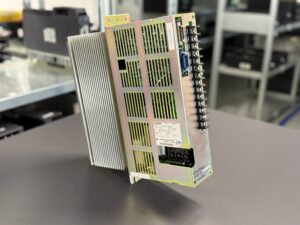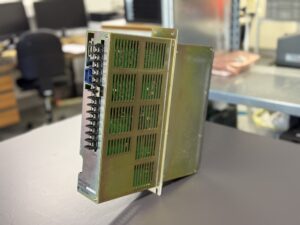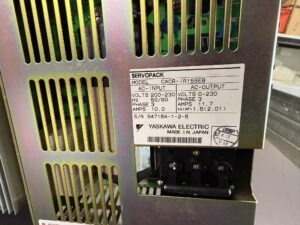12.05.2025 by Viktor Siebert
Yaskawa Servopack CACR-IR15SEB-P00-B04 – A Costly Lesson from Ignoring the Signs
A defective servo amplifier in a CNC machine that only started when warm – it sounds like a myth, but it happened to one of our customers. Out of fear that the unit wouldn’t start again if it cooled down, the operator kept the CNC machine running non-stop for almost a year. Weekends, holidays, nights – it was always on. The manufacturer offered no solution. Eventually, the inevitable happened: the Servopack failed during operation, blowing the fuses and shutting down the machine completely.
Only then, after tallying up the high electricity costs and production downtime, did the customer finally seek expert help.
This story is a reminder of how people often treat their health – ignoring clear signs for too long until something breaks down. The same happens with machines. The takeaway here is simple: acting early is always cheaper than letting things spiral. And one more point: not every so-called “specialist” tests repaired units properly. Some simply replace parts but skip real-world testing. Our advice: always ask how the repaired unit is tested and whether it is tested under load with a matching motor.
Final Thoughts
The customer’s decision to leave the CNC running for nearly a year to avoid a cold-start issue is understandable – yet incredibly costly. The electricity consumption, risk of fire, and eventual failure could have been avoided with a proper diagnosis early on.
This real-world story reminds us: don’t ignore the signs – in machines or in life. More importantly, ask how repairs are tested. A reputable service provider will test your repaired Servopack under load with a matching motor and verify real-world conditions before release.
If you’re dealing with issues like this or want your servo system properly tested and repaired, we’re ready to support you.



Further information such as price and delivery time for:
Yaskawa Servopack CACR-IR15SEB-P00-B04
More details about our Yaskawa repair expertise can be found here: Yaskawa CACR-IR CACR-HR Drive Reparatur bei Industrypart
Similar models we regularly repair:
CACR-IR15SEB
CACR-IR15SEBY20
Device Overview
The Yaskawa CACR-IR15SEB-P00-B04 Servopack is an AC servo amplifier used for precise motion control in industrial applications. It is part of Yaskawa’s IR series and delivers up to 1.5 kW of output power (approximately 2.0 HP). It operates on a three-phase 200–230 V AC input at 50/60 Hz and supplies up to 11.7 A to the connected AC servo motor.
The unit is designed for single-axis configurations and is commonly used in CNC machines or robots. With compact dimensions and a weight of around 5.5 kg, it fits standard control cabinets. Since this model has been officially discontinued by the manufacturer, spare parts and service are only available through independent repair specialists.
Key technical specifications:
| Parameter | Value |
|---|
| Input Voltage | 3-phase 200–230 V AC (50/60 Hz) |
| Input Current | 10.0 A (max) |
| Output Voltage | 3-phase 0–230 V AC |
| Output Current | 11.7 A |
| Output Power | 1.5 kW (≈ 2.0 HP) |
| Weight | approx. 5.4 kg |
| Use Type | Single-axis Servo Amplifier |
| Manufacturer | Yaskawa Electric, Japan |
Application Environment and Compatible Equipment
This Servopack is typically found in CNC machines (such as milling or turning centers) and industrial robotics systems. It drives Yaskawa AC servo motors, usually from the F-series, in the 1.5 kW range.
It operates as part of a motion system controlling one machine axis. It receives command signals from the CNC or robot controller and regulates the connected servo motor accordingly. In robots, it controls a joint axis; in CNC systems, it may control an X-, Y-, or Z-axis movement.
It works with feedback devices like incremental encoders, and communicates with controllers through analog voltage or digital pulse signals. Proper thermal management is required, as the unit dissipates significant heat during operation. The device is cooled using an integrated fan or cabinet ventilation.
Functional Description
The CACR-IR15SEB Servopack performs real-time control of the connected servo motor. It uses PWM (pulse-width modulation) to generate a three-phase AC signal that matches the motion command.
Commands can come via analog ±10 V signals or pulse/direction signals. The amplifier regulates motor torque via current control, adjusts speed, and interfaces with a feedback loop using encoder signals to maintain accuracy.
Key internal functions:
- PWM control at around 46.875 kHz
- Overcurrent protection
- Dynamic brake: Applies a braking resistor to quickly stop the motor in emergencies
- Overvoltage and undervoltage detection
- Error indication via LED and serial interface
- Motor feedback via encoder (U/V phases)
The unit stops the motor safely using the dynamic brake function in case of an emergency, such as loss of main power or system alarm. After such an event, it goes into a protected state and waits for reset.
Alarms and Troubleshooting
The CACR-IR15SEB monitors various operational parameters and can display error states. Alarms are categorized into operational issues (e.g., power or feedback faults) and hardware problems.
Operational alarms:
| Alarm Description | Possible Cause | Recommended Action |
|---|
| Overcurrent Detection | Short-circuit or blocked motor | Check motor and cables, verify load |
| MCCB Trip Detection | Circuit breaker triggered by overcurrent | Inspect breaker and wiring |
| Regenerative Problem | Brake resistor or regenerative circuit faulty | Test braking resistor and chopper circuit |
| Overvoltage Detection | Excessive DC bus voltage (e.g., during deceleration) | Inspect power supply and braking timing |
| Undervoltage Detection | Low supply voltage or power outage | Check incoming power, transformer, wiring |
| Ground Fault Detection | Phase-to-ground short circuit | Measure insulation resistance, replace motor |
| Current Offset Problem | Sensor drift or calibration loss | Recalibrate or repair control board |
| Current Command Disconnected | Control signal not received | Inspect input wiring, signal source |
| CPU Error | Main control processor failure | Power cycle; if persists, send for repair |
Internal hardware alarms:
| Error Code | Meaning | Possible Cause | Action |
|---|
| H0 | CPU ROM error | Corrupted or damaged ROM | Replace ROM or mainboard |
| H1 | CPU RAM error | RAM failure | Replace RAM or mainboard |
| H2/H3 | Serial communication error (test) | Bus fault or test mode error | Verify internal communication |
| H4 | Gate array failure | Logic chip fault | Replace or repair |
| H5 | EEPROM error | Parameter storage fault | Reset EEPROM or replace |
| H6 | Microprocessor error | 4-bit microcontroller failure | Replace internal processor |
| H7 | Current sensor U phase | Sensor or feedback fault | Replace or repair |
| H8 | Current sensor V phase | Sensor or feedback fault | Replace or repair |
Each alarm disables the amplifier (SVRDY goes off), requiring reset and potentially service intervention.